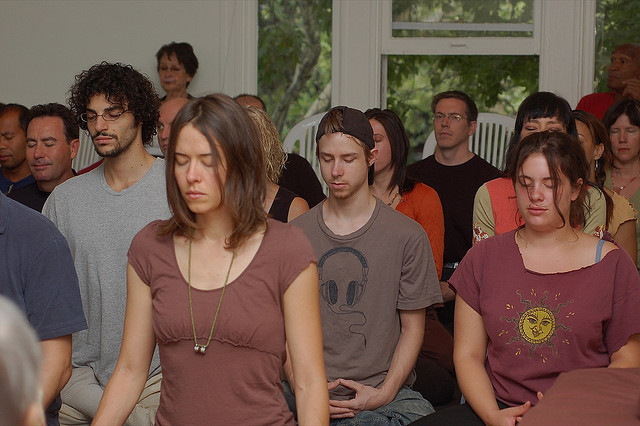In my own dream-world utopia everyone dances, practices some form of art and most importantly, meditates.
The shape of this utopia of mine reveals the reverence in which I hold meditation.
I, along with countless others, find a certain perspective and inner peace thanks in large part to meditation. Just about everyone can reap the beneficial byproducts of meditation. However, most of us shouldn’t meditate every day.
Before anything else is said, a disclaimer is in order.
This is not intended for those who already teach/guide meditations for a living, which in my humble opinion includes those who solely focus on hatha yoga and/or the asanas. I am by no means attempting to subvert or completely dismiss anyone’s already established meditation practice, nor am I in any way insinuating that meditation isn’t beneficial. Finally, I am in no way advocating for anyone to practice meditation any less than thrice a week.
Yes, meditation contains a multitude of benefits, both physical and mental. But if we truly wish to sit with ourselves in non-judgmental moments, it also helps to utilize once-in-a-while alternatives to the standard meditation routine.
This is so we don’t become overly reliant and attached to a single method, because that method may not always be available.
Here’s the thing: the mind and body are naturally attracted to patterns.
Think about our sleep schedules for a moment. For many, our circadian rhythms go out of whack after traveling around the world, and it takes time for both our minds and bodies to re-acclimatize. And while certain patterns and rhythms of life can be soothing and even beneficial for in the short term, it’s especially necessary to be cognizant and mindful of the reasons why we are practicing meditation, so we don’t become attached to the rhythms and patterns of certain mental states that meditation can bring about.
In other words, if we do the same thing every day, even if it’s beneficial, we’re going to hit a plateau of learning and openness.
I don’t mean to suggest that we should take a break from being mindful in our daily lives.
It’s important to be mindful of our emotions and feelings, especially when we are practicing anything that has the potential to bring up subconscious emotions and thoughts that we might consider to be unpleasant. Even though meditation can be revitalizing for many, sometimes it can still prove to be a little draining.
It’s the same concept behind after working out at the gym. You gotta take a break some days to allow your body to heal and rejuvenate properly.
But this idea goes beyond thinking of meditation as another form of exercise. Unlike exercise, we can’t just leave our feelings and thoughts somewhere to be worked out later. That’s not being present. This is where what we learn in meditation needs to be practiced outside of the every day meditation routine.
To quote Waylon Lewis, esteemed Elephant Journal editor,
“The point of meditation isn’t to be peaceful, to be better than where you are now or to get away from everything. It’s to be present. Present with whatever it is. The point is to be right here: raw, open, present, fiercely available, with a sense of humor and an allegiance not to pleasure or to being “right” but rather to learning and opening and helping others.”
Don’t worry, there are many other ways to meditate and practice mindfulness without having to sit down or go for a walk. Even Thích Nhât Hanh has said that
“Mindfulness isn’t something we practice only in the meditation hall; we also practice in the kitchen, in the garden, or when we’re on the telephone, driving the car, or washing the dishes.”
It can be so easy for many of us to get caught up in the schematics behind a meditation practice, getting lost in the details and forgetting to simply be in the moment with ourselves and the world around us. And while one of the core philosophies of Buddhism is about living in contentment, the only way we can appreciate that is to sometimes be challenged on days when things seem anything but peachy keen jelly bean roses.
It is in those difficult moments we can truly put into practice what we gradually learn through meditation.
Then we can be brave enough to allow ourselves to be present through experiences and emotions we might usually want to escape, and to center our selves and our thoughts in order to pass through these experiences, no matter how difficult.
By being present, not just in one circumstance but in all circumstances, little by little we are able to live in compassion and contentment.
~
Relephant read:
Mindfulness isn’t the new Anti-Depressant.
~
Author: Bryce Post
Editor: Khara-Jade Warren
Image: Kanzeon_Zen_Centre/ Flickr
~









Read 6 comments and reply